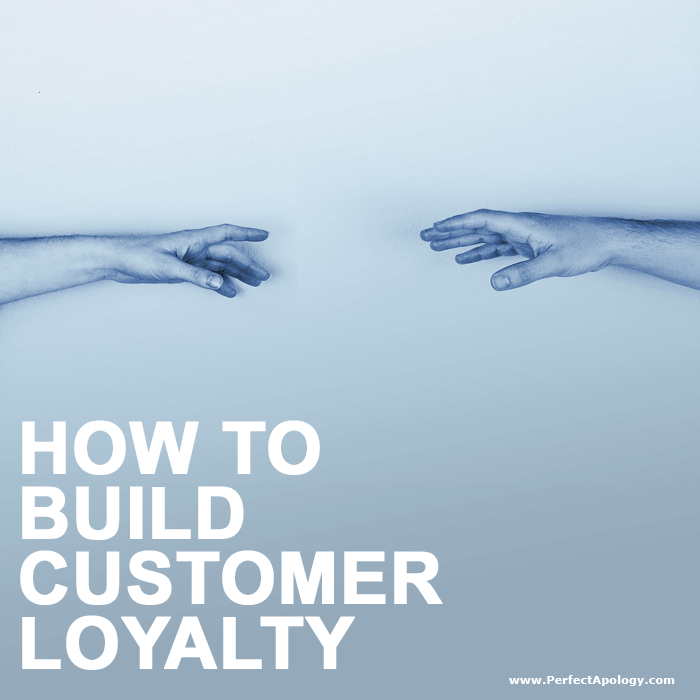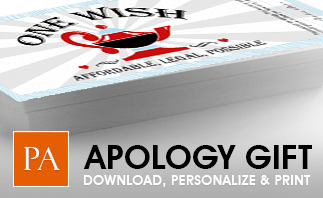Build Customer Loyalty With An Apology
Effective business apologies are a cornerstone to customer loyalty, satisfaction, trust, and retention.
We all hope to maintain standards of excellence when it comes to our business, however, no matter how close to perfect the business is, mistakes will be made and some customers will inevitably be disappointed about something.

A bad experience or poor service, whether real or perceived, can have a significant impact on your bottom line.
How employees, managers, and executives handle these types of situations will determine how a customer feels about the company, its staff, products, and services.
A customer who feels listened to, valued, and validated when things go wrong will forgive most errors and understand that mistakes can happen. Even though we'd rather mistakes didn't happen, as a business, we need to view these as opportunities to build customer loyalty.
And by extending a credible apology for the right reasons at the appropriate time is usually a good start to satisfying customers.
The OB Tampon Apology: Building Customer Loyalty:
Customer reactions to mistakes and business errors is the first place to look for opportunities on how to build customer loyalty.
Johnson & Johnson Canada and the creative team they hired created one of the most brilliant business apologies we've ever seen.
Although it doesn't meet all our requirements for what should be included in a perfect business apology, its effectiveness is unquestionable for developing, improving, and building customer loyalty.
So, how did Johnson & Johnson build customer loyalty by turning a negative into a positive?
They apologized with a music video. They targeted 100,000 North American customers who contributed to an international backlash over the discontinued o.b.® Ultra brand of tampons.
They sent the video via email, personalized each with the customer's name and promised a return of the tampons to North American stores. The email came complete with a printable coupon.
What's the added benefit of such a brilliant form of outreach that aimed to rebuild trust and customer loyalty to the brand?
The apology went viral with over 3 million hits in a weekend, and over 47 million just one year later. Consider that this campaign was done back in 2011,those numbers are astounding.
That's some great PR! It's a must-watch and is only a couple of minutes long.
Of course we don't all have the budget J&J does, however that doesn't mean that there aren't some important takeaways here on how to build customer loyalty.
By creating this apology video, they told their customers that they're listening to them, they understand the mistake they made, and that they want them back. Listen to the lyrics,
... I know we went away and let you down... believe me when I say, we want to turn this thing around... didn't mean to make you cry... didn't want to say goodbye... we're sorry... double sorry... triple sorry... you deserve the best and more, so take this coupon to the store
Look for opportunities in your own business and within your own budget, to take a pro-active approach to building customer loyalty.
Even without the video piece, send an email to your customers, be creative, make it stand out from every other email they've received.
Add humor, great graphics, etc. but most importantly tell your customers exactly how you feel about the situation as Johnson & Johnson did in the lyrics of this apology video.
Learning How to Build Customer Loyalty is Critical
Business Fact No.1: It's far easier to sell something to an existing customer than it is to acquire a new one.
Loyal customers bring with them a lifetime value—a value beyond the individual sale. Conversely, the loss of a loyal customer represents a significant accumulated loss over time.
As long as a customer remains satisfied they will continue the relationship and with each new satisfying experience their loyalty to the business strengthens. Loyal customers bring with them the added benefit of credible referrals and an expanding customer/sales base.
Business Fact No.2: Referrals reduce sales cycles and sales expenses while building a quality base of satisfied customers who, in turn, provide additional referrals.
Companies that generate this self-perpetuating cycle typically succeed with an excellent customer experience including outstanding customer service—sales (as opposed to customers) are never enough to create and sustain this cycle.
Business Fact No.3: Mistakes and errors are essential to consider when developing best business practices, precisely because they are inevitable.
Issues and problems are a part of doing business. Failures represent ideal opportunities for strengthening customer loyalty AND satisfaction. Although it seems ironic, welcoming the occasional failure may be a prudent business practice.
The real difficulty lies in the fact that years of routine and successful business relations with customers often raises expectations and standards—which becomes increasingly hard to sustain over the long term. Very loyal customers are often the ones most likely to be hurt when small mistakes are made so understanding how to build customer loyalty is critical.
As Jake Poore, who worked for 20 years in customer service and specifically on service recovery for the Walt Disney Company in Orlando and Paris entertaining 25-35 million people a year is quoted as saying,
...uneventful does not create loyalty, and does not drive return visits or intent to refer new business.
It is events, both negative and positive that are the driving force to building customer loyalty. Seek them out and use them.
You can read more about Jake Poore on our customer service page or look for him at Integrated Loyalty Systems, the company he founded after leaving Disney.
![]()
Apologies & Loyalty Are About Customer Expectations
Loyalty stems from the quality of your products or service AND very often from how you handle situations in which customer expectations have NOT been met—which is where apologies come into play.
Understanding the importance of continually building and improving customer loyalty is crucial to building and maintaining a successful business. And one of the easiest ways, and most opportune moments are when negative things happen.
The fact is that we are more inclined to assign a higher value to a recommendation or referral based on how a company handles a negative situation or crisis rather than how they handle routine, which is somewhat less relevant. (Read more on this topic in our research article on the customer experience)
It goes without saying that business today is highly competitive. It's now more important than ever to seek out loyalty building opportunities, and to appreciate the added value of prioritizing 'customers' over individual 'sales', especially when things go wrong.
Effective business apologies, when well crafted and handled correctly will help to solidify relationships, enhance a company's reputation, build trust, satisfaction, and is crucial to building customer loyalty in your business.
Can you really afford to ignore failures and avoid apologizing?
Learn how to manage customer complaints and why a proactive approach to customer retention is important for any business.


